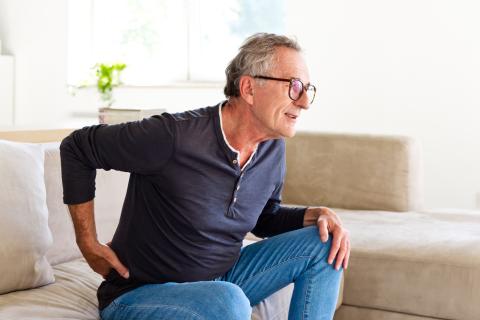Kidney Stones Q & A
Q: What are kidney stones?
Kidney stones are hard, pebble-like deposits that form in the kidney, created from certain minerals in the urine. People can have kidney stones without knowing—they might be very small and smooth, passing from the kidney through the urinary tract without symptoms.
But sometimes a stone is larger—perhaps the size of a pea, or, rarely, even the size of a golf ball! Most stones are smooth, but some are jagged and more likely to become stuck somewhere in the urinary tract. The stone can block the flow of urine, and be excruciatingly painful.
There are several types of kidney stones:
- Calcium oxalate stones are the most common and are caused by high levels of certain substances in the urine.
- Uric acid stones happen when a high level of purines, a natural chemical compound, causes kidney stones to form.
- Struvite stones are less common and are caused by urinary tract infections.
- Cystine stones are the least common and happen when a person has a genetic condition called cystinuria, in which a certain amino acid leaks into the urine.
Q: Who gets kidney stones?
According to the National Institute of Diabetes and Digestive and Kidney Diseases (NIDDK), 11% of men and 6% of women will experience a kidney stone at least once during their lives.
Risk factors include:
- A personal or family history of kidney stones or conditions that cause certain substances to accumulate in blood and urine
- Other kidney and digestive diseases
- Repeated urinary tract infections or blockage of the urinary tract
- High blood pressure, diabetes, obesity
- Not drinking enough fluids
- A diet that is high in salt and sugar
- Taking certain medications.
People of any age can have kidney stones. Certain types may be more common as we grow older. For example, in people with incontinence, urine may be retained longer, and the person might reduce their fluid intake, both of which could promote the formation of stones.
Q: How are kidney stones diagnosed?
Pain is the main symptom of a kidney stone. Kidney stones can cause extreme back pain that doesn’t go away, blood in the urine, fever, and chills, vomiting. A person may notice discoloration or a foul smell in their urine, or a burning sensation upon urination.
It’s important to report these symptoms to the doctor. Doctors diagnose kidney stones with tests of the urine and blood, with an examination and analysis of stones. X-ray and CT scan imaging can help the doctor find kidney stones, and also show if a patient has a problem that could cause kidney stones to form, such as a blockage in the urinary tract.
Q: How are kidney stones treated?
Small stones usually pass through the urinary tract on their own. Larger stones, and those with an irregular shape, may not pass on their own, and this requires urgent treatment. Kidney stones can lead to urinary tract infections and even loss of kidney function. Fortunately, with treatment, kidney stones rarely cause permanent damage.
If a kidney stone doesn’t pass by itself, there are several treatment options:
Using shock waves (lithotripsy) to break the stone into small pieces so it can more easily pass.
A scope inserted into the body allows the doctor to see, and then remove the stone.
Surgery to locate and remove the stone.
Q: Is it possible to prevent a recurrence of kidney stones?
The first step in reducing the risk of kidney stones is to understand what’s causing them. Once the type of stone is determined, the doctor might recommend:
- These might include antibiotics, or medicines to reduce the substances from which kidney stones form.
- Drinking more liquids. This keeps the urine diluted and helps flush away minerals that cause stones. The doctor will recommend the type and amount of fluid patients should consume, also taking into account other health conditions the patient might have.
- Changing the diet. Targeted dietary changes can reduce the risk. Reducing salt in the diet is often the first step. Certain foods raise the risk of certain types of stones, but not others. A dietitian who specializes in kidney stone prevention can prescribe the proper diet—including both foods to eat more of, and foods to avoid.
- Maintaining a healthy weight. Being overweight increases the risk of kidney stones.
The information in this article is not intended to replace the advice of your healthcare provider. Call the doctor right away if you think you might have a kidney stone.
